Agents often work under tremendous pressure. They bear the brunt of escalated customer issues and are at the receiving end of the frustrations that often come with them. However, like all of us, they crave recognition and a sense of achievement. This feeling not only boosts their morale but also improves agent engagement, employee satisfaction, and team accomplishments, which all lead to a better work environment.
Here are eight tips for creating a sense of achievement in your call center:
1. Set Clear Goals and Expectations
The key to fostering a sense of achievement in the call center lies in setting precise goals and expectations. Goals act as the guiding stars, providing direction to the employees. They not only keep the agents focused but also provide a sense of purpose. When these goals are accomplished, it nurtures a feeling of achievement which further boosts motivation and overall performance.
To set clear and realistic goals, employ the SMART strategy – Specific, Measurable, Achievable, Relevant, and Time-bound.
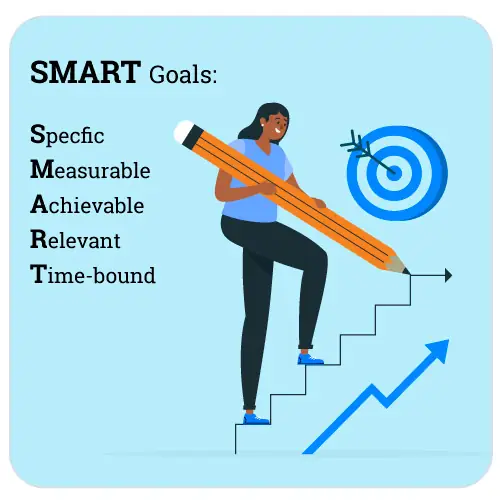
- Specific: The goal should be well-defined and clear.
- Measurable: The progress of achieving the goal should be quantifiable.
- Achievable: The goal should be realistic and attainable.
- Relevant: The goal should align with the overall call center objectives.
- Time-bound: The goal should have a specific timeline for completion.
For example, a goal could be to reduce average customer wait time by 20 seconds during peak hours within the next two months. This goal follows the SMART protocol because:
It is specific: The goal is well-defined, focusing on reducing the average wait time for customers specifically during peak hours.
It is measurable: The progress is quantifiable by aiming for a 20-second reduction in average customer wait time.
It is achievable: This goal is realistic and attainable within a two-month timeframe, as it targets a specific aspect of customer service that can be optimized.
It is relevant: Improving the average customer wait time aligns with the call center's objective of providing efficient and timely service.
It is time-bound: The goal has a specific timeline of two months, providing a clear deadline for achieving the 20-second reduction in average customer wait time during peak hours.
2. Provide Regular Feedback and Recognition
One of the most potent tools at your disposal for fostering achievement within your call center is consistent and meaningful feedback. This goes beyond mere recognition for a job well done, extending into constructive criticism that challenges your team members to learn and grow, providing them with clear benchmarks for improvement.
For example, during a weekly meeting with an agent, a supervisor could say:
“I want to give you props for your dedication to excellent service—very impressive. Your personalized approach is spot on, and customers are noticing. Now, to take things up a notch, consider honing in on how you handle objections. I noticed during [specific call or scenario] that your quick thinking and clear explanations were very helpful. Consider leaning into that more—anticipate objections and continue to address them proactively.”
Best practices for providing feedback and recognition in a call center:
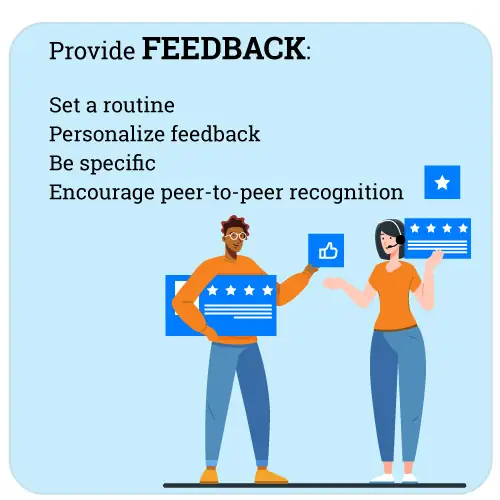
- Set a routine: Ensure that feedback is a regular part of the agenda, not an occasional afterthought. This brings consistency and showcases that feedback is an integral part of growth and training.
- Personalize feedback: Each agent is unique, so feedback should be also. Take the time to properly tailor your comments to the individual and the situation.
- Be specific: The more detailed the feedback, the more useful it will be. Rock-solid, clear feedback paves the way for improvement and progression.
- Encourage peer-to-peer recognition: Create a culture of appreciation where teammates take time to recognize their colleague's hard work. This amplifies team bonds and motivates everyone toward collective success.
mySQM™ QA 360º feedback platform is built to transform traditional QA to ensure a positive impact on improving CX and lowering operating costs. mySQM™ Customer Service QA software includes monitoring call compliance and CX sentiment data using artificial intelligence (AI) and through a post-call phone or email survey of the service they received from the call center agent.
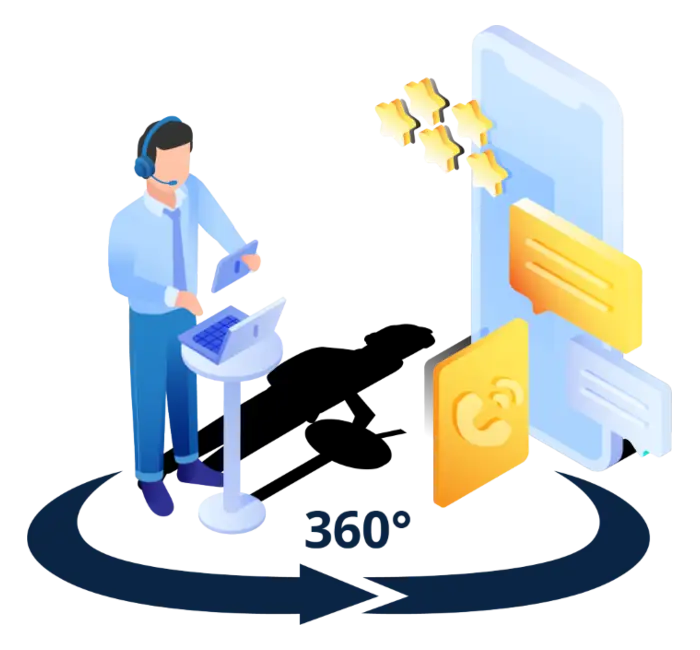
3. Encourage Teamwork and Collaboration
Building a culture of teamwork and collaboration is paramount in the call center. This tip is essential because when agents work together, they can share knowledge and skills, solve problems more efficiently, and help each other reach performance targets.
Building a collaborative atmosphere in the call center can be cultivated by implementing a few key strategies:
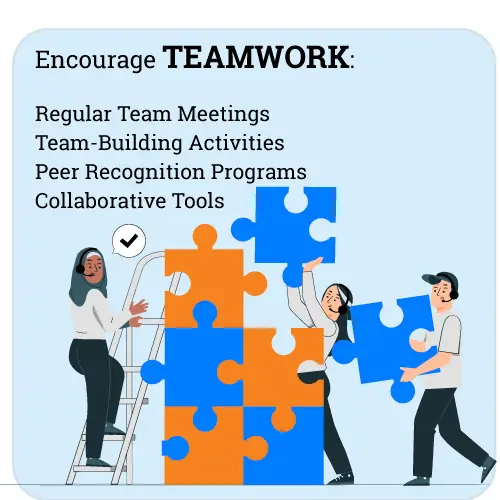
- Regular Team Meetings: Encourage open communication and problem-solving in a shared space.
- Team-Building Activities: These could range from team dinners to professional development workshops.
- Collaborative Tools: Invest in technology that facilitates real-time communication and collaboration among team members, like shared digital dashboards or task management tools.
- Peer Recognition Programs: Create mechanisms for employees to recognize and celebrate each other’s achievements.
For example, a company has biweekly lunches with all their call center agents where they play team-building games and celebrate their best-performing agents for that two-week interval. This is a great way to facilitate relationship-building between agents and to foster a sense of camaraderie in the call center.
4. Offer Opportunities for Skill Development and Growth
Enhancing your agents' skills leads to improved performance and increased confidence, fostering a culture of accomplishment. As agents feel more confident, they become more engaged in their work, which influences motivation and team achievement positively. Agents are more motivated when they know they have the chance to learn and grow, leading to greater job satisfaction and a higher likelihood of going the extra mile to achieve success.
There are numerous ways to enhance skill development and growth:
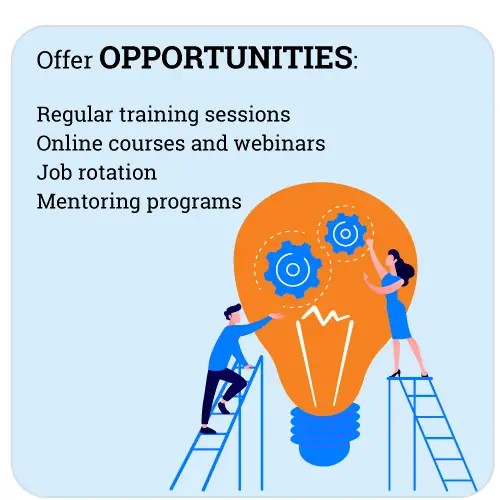
- Regular training sessions: Equip agents with the tools and knowledge they need to excel in their roles.
- Job rotation: Allows agents to experience different roles, expanding their skill set and giving agents a more well-rounded understanding of the organization.
- Mentoring programs: Pairing a less experienced agent with a seasoned agent or supervisor can improve skills and boost morale.
- Online courses and webinars: A flexible way for employees to learn new skills or deepen their knowledge in specific areas.
For instance, the marketing team might have a training session on the latest digital marketing strategies, while the IT department might focus on cybersecurity best practices. Or your company might encourage job rotation by allowing agents to apply for a temporary assignment in a different department every year.
5. Celebrate Team Accomplishments
Firstly, acknowledging accomplishments boosts morale. It empowers your agents, creating a positive work environment replete with energy, motivation, and productivity. When you celebrate team accomplishments, you are essentially acknowledging your agents' hard work and diligence and building their confidence in the process. Furthermore, public recognition can promote healthy competition among teams, thereby positively influencing overall team performance.
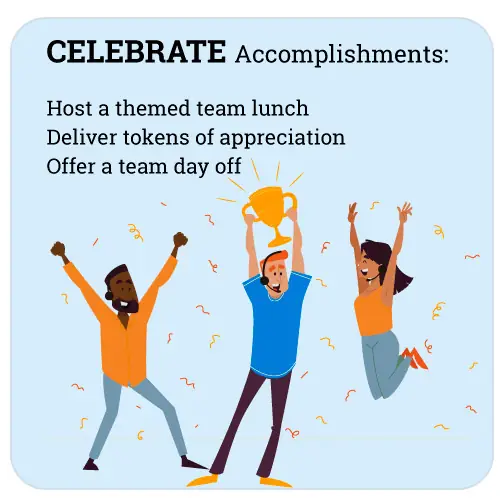
Adopting creative ways to celebrate can make the acknowledgment more enjoyable. Here are some examples:
- Host a themed team lunch or a fun game day to foster better relations among employees, promoting a more collaborative environment.
- Deliver personalized tokens of appreciation like customized mugs or certificates, showcasing the team's unique achievements.
- Offer a team day off or let them leave early one day as a sign of appreciation for their hard work.
- Implement a wall of fame, displaying a spotlight on the team's achievements.
Highlight team accomplishments in your company newsletter or social media, casting a wider appreciation net for your employees' hard work.
6. Foster a Positive Work Environment
A positive work environment is a vital contributor to a strong sense of achievement in the call center. When workers feel valued, respected, and satisfied in their jobs, they are more likely to perform at their best. A positive work ambiance can reduce stress, increase employee satisfaction, and foster productivity and performance. It boosts morale, enhances teamwork, and importantly, creates a strong culture of accomplishment.
Creating a positive environment in a call center is not a one-size-fits-all solution. Here are some necessary steps:
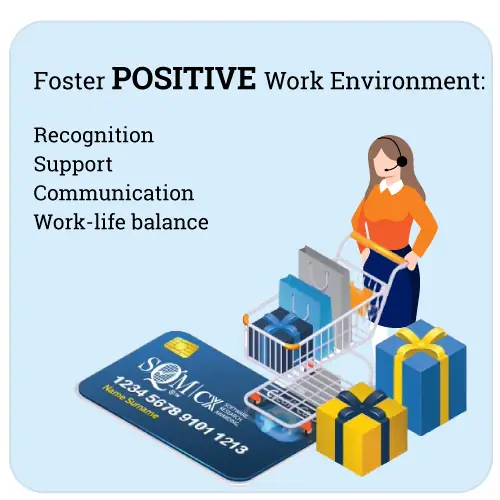
- Recognition: Acknowledge good performance openly and frequently. For example, SQM’s Rewards and Recognition feature allows agents to receive award points based on post-call surveys and QA performance. These award points are captured in real-time and converted to dollars, which can then be redeemed using an SQM debit card.

- Support: Provide the right tools, training, and resources necessary for employees to excel at their jobs. For example, set your agents up for success by putting them through a formal training program before they interact with clients.
- Communication: Regular feedback and open conversation channels can build trust and enhance agent engagement and productivity. For example, have monthly check-ins with your agents and supervisors to give them a chance to bring up any issues or concerns they may have.
- Work-life balance: Offer flexible schedules, remote work opportunities, and a healthy work-life balance to reduce burnout. For example, use an agent self-service system that allows agents to have more control over their own schedules.
7. Employ a VoC Closed-Loop Process
According to Gartner stat: 95% of companies collect customer feedback. Yet only 10% use the feedback to improve, and only 5% tell customers what they are doing in response to what they heard. If customers take the time to provide feedback to help call centers improve service, organizations should close the loop with customers. Put simply, after receiving the customer feedback, action it.
Call center leaders are increasing investments in VoC programs and software that employ a VoC closed-loop process. At SQM, our VoC closed-loop process consists of four steps – Identify, Develop, Check, and Act (IDCA) to improve FCR and customer service performance. The four ongoing sequential steps of our IDCA VoC closed-loop process are:
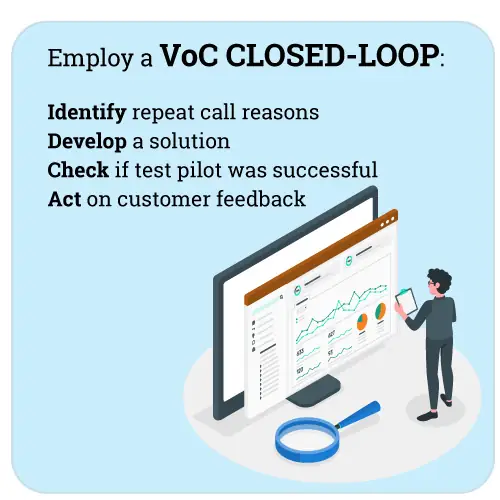
- Identify repeat call reasons to improve by measuring FCR and Csat performance.
- Develop a solution and implement a test pilot to reduce repeat call reasons.
- Check to see if the test pilot was successful by measuring changes in FCR.
- Act on customer feedback by implementing a standardized improvement plan for reducing repeat call reasons for the entire call center.
8. Empower Agents to Make Decisions
Empowering agents to make decisions is a powerful tool for enhancing their sense of achievement. Giving them the discretion to resolve customer issues without always seeking approvals increases their job satisfaction and boosts confidence. It also creates a sense of responsibility and accomplishment, driving them to perform better. Consistently, the result is improved productivity, better customer service, and, ultimately, higher team accomplishments.
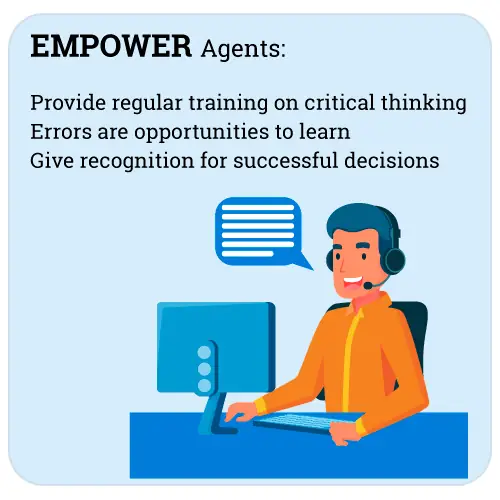
Here are some examples of ways to empower your agents:
- Provide regular training on critical thinking and decision-making processes.
- Supply agents with up-to-date resources and materials.
- Encourage agents to think outside the box and take calculated risks.
- Reinforce the view that errors are not failures but opportunities to learn.
- Give recognition and rewards for successful decisions.
